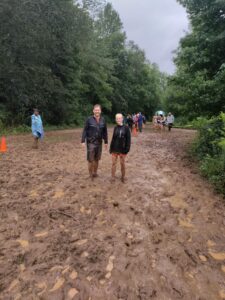
son and grand daughter at cross country meet
The Thanksgiving holiday, which we’re celebrating in the US this week, has always been a favorite of mine. Not only is it less commercialized than other holidays, but it invites peaceful reflection and giving thanks for the good things in our lives.
We often offer our thanks around a dinner table with family and friends. It may sound like, “I’m thankful for this… or I’m thankful for that…” Sometimes my expressions are pretty surface. Sometimes I try to go a little deeper. Whichever, I recognize that verbalization of gratitude is a worthwhile habit that can shift our feelings and deepen our sense of wellbeing.
Expanding my Thanks
However, I’m aware, as I write this, that I’d like to make my practice more expansive. What if I could accept all of life, not just that which my mind judges as “good.”
Is this possible? Is it even desirable?
Enlightenment
I read a quote, not long ago, which stated that “Enlightenment is bringing friendship to the whole of existence.” Frankly, I don’t recall who said this. But I have since thought about it.
I think of the word enlightenment as an “awakening,” being present and looking deeply and seeing life clearly which requires letting go of preconceptions, judgements and pretense. In my Christian tradition I might substitute the word “heaven” for enlightenment.
I think of the word “friendship” and want to substitute the word “goodwill” or better yet, “love.”
Perhaps the most powerful concept in this statement is the “whole of existence.” Whoa, that’s big. Now we’re talking about more than our typical expressions of gratitude in which we give thanks for the “good” while ignoring the “bad.” The “whole of existence” is not only about “this” or “that.” I’ve stepped away from dualism and dichotomies to embrace all of life in its totality.
For me, that is the meaning of enlightenment (or heaven in my frame of reference).
Heaven is bringing love to the whole of existence.
Not just the good. The whole of it.
Maybe I don’t need to divide up the people, circumstances, and the moment-by-moment experiences of my life into good and bad, right and wrong, for me or against me. Maybe I can simply allow them to be “what is,” part of the great mystery and experience of life without the need to resist and fight against so much of existence.
- My aging, declining body
- A “toxic” co-worker
- An “unfair” agency/institution
- My struggle with technology
- Someone I love on a trajectory downward
- An economy headed who knows where
- Wars and famines in some part of the world
- The loss of a dream
- The passing of a loved one
It doesn’t mean I like everything or that I don’t feel grief and sorrow. Nor does it mean that I roll over or feel like a victim. Furthermore, it doesn’t mean I don’t take action in those areas within my control and responsibility.
It does mean that I let go of my entitlement (demands that life be a certain way for me to feel okay) and that I relinquish some measure of judgement and resistance. Maybe it means that I make space, sit in stillness, even acknowledge my grief as part of my experience.
Come What May…
It reminds me of a talk by Joseph B. Wirthlin, a religious leader of my faith, entitled “Come What May and Love It.” Or, of the title of one of my favorite self-help books, Loving What Is by Byron Katie. Or, of Richard Rohr’s quest to “forgive everything.”
The more we can recognize that life is good and bad, the more we can accept life on its own terms, the more our hearts and souls expand. This is, in fact, the key to our growth, emotional maturity, and peace.
Applying These Lessons to My “Hard” Day
Today was, frankly, a “hard” day. A number of incidents and realizations converged upon me which left me in a jumble of unwanted emotions, testing my very theory of heaven and enlightenment.
And so I made space for myself. I wrapped myself, metaphorically and literally, in a blanket of compassion. The four corners of my blanket represent: awareness, inner wisdom, strength/fortitude, and loving kindness. And I sat in stillness for many minutes, allowing and noticing the coming and going of my feelings and thoughts, allowing a deeper self, wholeness, and knowing to emerge. Gradually, the discordance shifted and I felt peace and strength in my own heart as well as compassion and acceptance for others.
I realized, once again, that heaven is not simply “out there” in a distant future, but something we create “in-here” as we bring love (space, stillness, tolerance, acceptance) by giving thanks for the whole of existence. My hope/intent is to continue to do so in this Thanksgiving season.
I’m interested in your thoughts.

Roger, I found this challenging to my thinking at first. Reading through it a second time, I became more comfortable with it. I, and would think others, try to compartmentalize experiences in order to understand situations from my perspective. This at times creates conflicts in my mind that may not be necessary. Viewing things as part of the whole of existence may eliminate the discord and conflicts I create in my mind.
Enjoy your Thanksgiving.
Charli
Thanks for your comment, Charli. Yes, it is a challenging concept. I agree. I’m glad you became more comfortable with it. The bigger perspective from which we can view any situation, the better we’ll be able to respond. Of course, sometimes, it does take working through feelings and our initial reactions to become more accepting, even of those realities we find difficult.